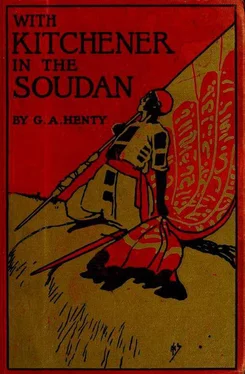He observed that even the black troops suffered from the heat. They had erected screens with their blankets placed end to end, supported by their guns, and lay there, getting what air there was, and sheltered from the direct rays of the sun. Few slept; most of them talked or smoked. There was some argument among the officers as to the relative advantages of night and day marches. All agreed that if only one march had to be done it was better to do it at night; but when, as in the present case, it would last for seven or eight days, many thought that, terrible as would be the heat, it would be better to march in the day and permit the troops to sleep at night. This opinion certainly seemed to be justified, for at the end of the third day the men were so completely worn out from want of sleep that they stumbled as they marched, and were with difficulty restrained from throwing themselves down to get the much-needed rest.
Gregory always went down as soon as the column arrived at its halting-place, as he did before starting in the evening, to bathe in some quiet pool or back-water; and much as he had set himself against taking spirits, he found that he was unable to eat his meals unless he took a spoonful or two with his water or cold tea.
On the evening of the third day they passed the battle-field of Kirbekan, where General Earle fell when the River Expedition was attacked by the Dervishes. Next day they halted at Hebbeh, where Colonel Stewart, on his way down with a number of refugees from Khartoum, was treacherously murdered; a portion of the steamer was still visible in the river. Day after day the column plodded on, for the most part strung out in single file, the line extending over many miles, and late on the evening of the 6th of August they reached a spot within a mile and a half of Abu Hamed, the hundred and eighteen miles having been accomplished in seven days and a half.
So far as they knew, the enemy had as yet received no news of their approach. Three hours' rest was given the troops, and then they marched out in order of battle. A fail idea of the position had been obtained from the friendly natives. Abu Hamed lay on the river. The desert sloped gradually down to it on all sides, with a sharp, deep descent within two hundred yards of the town. The houses were all loopholed for defence. When within a mile of the town they must have been sighted by the Dervish sentries on a lofty watch-tower. No movement, however, was visible, and there was a general feeling of disappointment as the impression gained ground that the enemy had retreated. The 9th and 10th Soudanese made a sweep round to attack from the desert side; the 11th, and half of the Egyptian battalion—the other half having been left to guard the baggage—followed the course of the river.
Major Kincaid rode forward to the edge of the steep slope that looked down to the town. He could see no one moving about. The Dervish trenches, about eighty yards away, appeared empty, and he was about to write a message to the General saying that the place was deserted, when a sharp fire suddenly opened upon him. He turned to ride back to warn the General, but he was too late, for at the same moment Hunter with his staff galloped up to the edge of the slope and was immediately saluted by a heavy volley, which, however, was fired so wildly that none of the party were hit. The artillery were now ordered to bombard the place. At first they could only fire at the tops of the houses, but, changing their position, they found a spot where they could command the town. For half an hour this continued. The infantry were drawn up just beyond the brow, where they could not be seen by the defenders. The Dervishes gave no signs of life, and as the artillery could not depress their guns sufficiently to enable them to rake the trenches, the infantry were ordered to charge.
As soon as they reached the edge of the dip a storm of musketry broke out from the Dervish trenches, but fortunately the greater portion of the bullets flew overhead. Macdonald had intended to carry the place at the point of the bayonet without firing, but the troops, suddenly exposed to such a storm of musketry, halted and opened fire without orders, the result being that they suffered a great deal more than they would have done had they crossed the eighty yards which divided them from the trench by a rush. Standing as they did against the sky-line, the Dervishes were able to pick them off, they themselves showing only their heads above the trenches. Two of the mounted officers of the 10th were killed, and two had their horses shot under them. Macdonald and his officers rushed along in front of the line, knocking up the men's muskets, and abusing them in the strongest terms for their disobedience to orders.
The moment the fire ceased the troops rushed forward, and the Dervishes at once abandoned their trenches and ran back to the line of houses. These were crowded together, divided by narrow winding lanes, and here a desperate struggle took place. The Dervishes defended themselves with the greatest
tenacity, sometimes rushing out and hurling themselves upon their assailants, and defending the houses to the last, making a stand when the doors were burst open, until the last of the inmates were either shot or bayoneted. So determined was the defence of some of the larger houses, that it was necessary to bring up the guns and batter an entrance. Many of the houses were found, when the troops burst in, to be tenanted only by dead, for the Soudanese always heralded their attack by firing several volleys, and the bullets made their way through and through the mud walls as if they had been paper. About seventy or eighty horsemen and a hundred Dervish infantry escaped, but the rest were either killed or made prisoners, together with Mahomed Zein, the governor. A quantity of arms, camels, and horses were also captured. The loss on our side was two British officers killed and twenty-one of the black troops, and three Egyptian officers and sixty-one men wounded.
When the convoy halted previous to the troops marching to the attack, Gregory, whose duties with the baggage had now ended, joined the General's staff and rode forward with them. Hunter had glanced round as he rode up, and answered with a nod when he saluted and asked if he could come. He felt rather scared on the Dervishes opening fire so suddenly, when the General's impatience had led him to ride forward without waiting for Major Kincaid's report. After the troops rushed into the town the General maintained his position at the edge of the clip, for the narrow streets were so crowded with men that a group of horsemen could hardly have forced their way in, and it would be impossible to see what was going on and to issue orders.
Mahomed Zein had not followed the example of some of his followers and died fighting to the last. He was found hiding under a bed, and was brought before General Hunter, who asked him why he fought when he must have known that it was useless, to which he replied: " I knew that you had only three times as many as I had, and every one of my men is worth four of yours. You could not fire till you were quite close up, and at that range our rifles are as good as yours." The General asked what he thought Mahmud would do, to which he replied: "He will be down here in five days and wipe you out! "
It was necessary to halt at Abu Hamed until stores came up. Captain Keppel, R.N., and the officers commanding the gunboats were toiling at the cataracts to bring them up; nevertheless one of these was capsized, and only three got through safely. Major Pink with a large number of troops from Merawi succeeded in hauling the sailing boats through. A large column of laden camels was at the same time being pushed forward by the caravan route from Korosko. It was a time of much anxiety till stores began to arrive, for had Mahmud advanced at once the passage up the river would have been arrested and the land column cut off, in which case the little force would have been reduced to sore straits, as they must have stood on the defensive until reinforcements reached them. There was, too, some anxiety as to the safety of the forces at Ambukol and Korti, for Mahmud, on learning that the garrisons had been weakened by the dispatch of troops to Abu Hamed, might have crossed the desert with all his force and fallen upon them. Mahmud had indeed, as it turned out, believed that the expedition to Abu Hamed was only undertaken to cover the flank of the Egyptian army from attack from that quarter, and still believed that it was from Merawi that the main British force would advance against him.
Читать дальше












